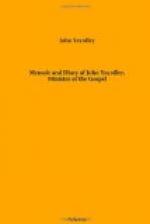5 mo. 21.—Yearly Meeting of Ministers and Elders. Third-day morning. Our visit to the Grecian Islands, &c. claimed the attention of the meeting. It was a very precious time; a sweet solemnity prevailed; several Friends said afterwards, they thought they had never known quite so full an expression of unity and encouragement on any former occasion. What a favor it is to have the sympathy and concurrence of the church in such important concerns! My heart’s desire and prayers are that we may be preserved humble and watchful, relying for help and strength on nothing short of our Divine Master, the holy Head of his own church. Whatever may befal us on our intended journey, I wish once more to record my firm conviction that it is the Lord’s requiring, and come life, come death, I desire that my heart and soul may be given up fully to follow Him who laid down his own precious life for my sake,—a poor unworthy sinner.
CHAPTER XI.
THE THIRD CONTINENTAL JOURNEY, OR THE JOURNEY TO GREECE.
1833-4.
PART I.—THE JOURNEY TO ANCONA.
John and Martha Yeardley left London on the 21st of the Sixth Month, 1833.
Travelling through France they found in the places where they halted more of simplicity and Christian life than they had expected. In Paris, especially, they were quickly brought into contact with a number of pious persons to whom their society and their doctrine were welcome, and they visited many benevolent institutions conducted on broad Christian principles. This was in the early part of Louis Philippe’s reign, and under the administration of Guizot. In reading their account of these institutions, we are painfully reminded how much the rising tide of religious liberty has been checked and driven back by the bands of priestcraft and arbitrary power.
Here, and elsewhere during their journey, they wrote letters to members of the Foreign Committee of the Meeting for Sufferings, descriptive of their religions labors, from which, after their return, a selection was printed for the use of Friends. Besides these letters, John Yeardley kept his usual Diary, which often enables us to add to the narrative, traits of character and reflections not to be found in their joint epistles.
Amongst the first persons upon whom they called in Paris, were the Protestant bookseller Risler, and Pastor Grandpierre: the former they found to be devoted heart and soul to the diffusion of evangelical religion; the latter they had known on their former journey, and he received them as his Christian friends. He introduced them to Mademoiselle Chabot, a lady who spent her time in translating religious and useful books into French, and had a class of children in the First-day school. Respecting this lady, they say:—




